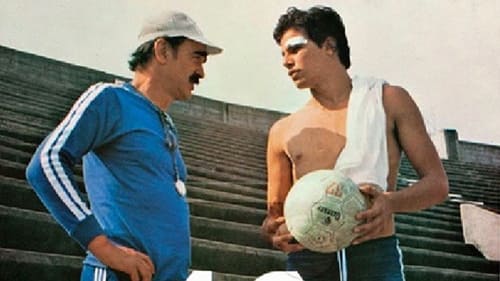Ana Maria Nascimento e Silva
Рождение : 1952-04-12, Rio de Janeiro, Rio de Janeiro, Brazil
Смерть : 2017-11-30

A bank manager has a secret. He is compelled to bite society women hands.

Producer
Fortune takes four human beings to the last frontier of passion. There, where love becomes almost inhuman and divine. As if he was a comet, Rafael, the traveler, appears at the party for the cities patron saint, in a small town in the interior of Minas Gerais. He is the one who brings passion and crime, vanishing afterwards, leaving a poetic feeling in the air, which is always deadly to the ones who stay. Mrs. Ana de Lara, the proud rich widow, and Missy, still a child, whose beauty and innocence are like the Tiê-Sangue, a red bird, are the travelers victims. There is also Master Juca do Vale, a criminal, whose passion turns him incredibly human, in this story of love, death, forgiveness and resurrection.

Anita
Fortune takes four human beings to the last frontier of passion. There, where love becomes almost inhuman and divine. As if he was a comet, Rafael, the traveler, appears at the party for the cities patron saint, in a small town in the interior of Minas Gerais. He is the one who brings passion and crime, vanishing afterwards, leaving a poetic feeling in the air, which is always deadly to the ones who stay. Mrs. Ana de Lara, the proud rich widow, and Missy, still a child, whose beauty and innocence are like the Tiê-Sangue, a red bird, are the travelers victims. There is also Master Juca do Vale, a criminal, whose passion turns him incredibly human, in this story of love, death, forgiveness and resurrection.

The film follows Manuel Maria du Bocage, 18th-century poet, as he travels through the world from orgy to orgy and from excess to excess.

After an extended period directing original screenplays, dos Santos returned to the creative engagement with literature that was the wellspring of his early masterpieces, offering a combinatory adaptation of five stories by the renowned Brazilian novelist João Guimarães Rosa. Openly embracing a mode of magical realism, dos Santos' celebrated film tells the story of a farming family defined by the absence of its father who abruptly abandoned his wife and children, sailing away down the river, including his son who continues to communicate with his father, speaking daily to him from the river bank. While offering an evocative vision of rural Brazil as a timeless land of mystery and solemnity, The Third Bank of the River is also bitingly satiric in the remarkable depiction of religious belief when the family moves to the city and its youngest member, a mesmerizing little girl, is revealed to be a kind of saint, capable of miraculous acts. -Harvard Film Archive


Grieved over the loss of their daughter, an elderly couple has decided do spend their vacation travelling around Europe. The cab driver who takes them to the airport, Leo, overhears their conversation and decides to profit from their situation: Leo convinces the couple's staff he's their nephew, and invites his friends and girlfriend over for a special summer. Things go awry when his friend Marcelo arrives with a bus full of teenagers, who believe the mansion is actually a summer camp.

Biography of one of the legendary names in the Samba genre of Brazilian music. Although he could hardly dance or play an instrument, he became one of the main composers of Portela, an important Samba "school" in Rio de Janeiro.

Rich girl travels with her fiancé (a cousin) to the family farm, where they're going to marry. But finds another cousin in love with her who does everything to hamper the wedding.

Helena
São Paulo, late 30's. Alberto (Paulo César Pereio) is an intellectual and professor who announces to his friend and pupil Polidoro (Nuno Leal Maia) he won a scholarship to study in Paris. In Paris Polidoro receives a letter in which Alberto announces that he married Helena (Ana Maria Nascimento e Silva). Polidoro returns to Brazil in 1945, when there was a strong political agitation against the New State. Alberto invites Polidoro to spend a few days at his home in Campos do Jordão. After reaching the site he is told by Helena that Alberto was forced to travel urgently. She insists he should stay there until the return of her husband and, while waiting, she seduces him. Then, after several days of intense passion, she orders Polidoro to go away and never see her again.

Story of a modest but talented soccer player for an obscure club in a small Brazilian town who comes to São Paulo and reaches stardom.

Arlete
In São Paulo, a businessman wants to rehabilitate street children, called "trombinhas", through a social project. After being discouraged by the police, he seeks help from the coach of the Santos Futebol Clube youth team.

Volga
Shy countryboy from Itu (a town in Brazil where everything is unusually big) is invited to work in the house of a rich woman, who ends up discovering the boy's hidden (and big) qualities...

American crew member
After assaulting a Hollywood film crew, a group of residents of a community in Rio de Janeiro decided to produce a film that would express the reality of Brazil - with the theme of Inconfidência Mineira.

Matilde de Obá
Tonho Tiê really likes living free, playing capoeira and drinking. During Carnival he meets Zulmira, a beautiful woman. On Ash Wednesday, the day of Iansã and Xangô, they pledge love and projects for many children. But time passes and Tonho returns to being the womanizer he had always been. Zulmira, daughter of Iansã, cannot stand Tonho's brazenness, and asks her saint-mother to wash her honor with blood. An Exu is invoked, who in the form of a woman, must make Tonho suffer and pay for his sins. Iaba is her name. Tonho's life starts to get complicated. To meet Iaba's needs, Tonho buys dresses, perfumes and jewelry. But the pomba-gira is not content. She wants to make a worker out of Tonho. No longer supporting Iaba's demands, Tonho decides to look for a terreiro to unload. He receives strength from his orixá, Xangô, and starts a quest to get rid of Iaba's clutches.












